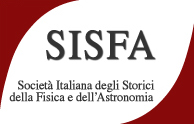Conveners
Augusto Righi (1850-1920)
- Danilo Capecchi
Thanks to Istitutional Archives' and Righi's Family materials (documents, manuscripts, letters, photos...) and a new deep look to several Righi's published original papers, it will be possible to run over again his scientific production, so to offer to the attention of the Readers a better comprehension of the original and fundamental role developed by Righi in Physics, in comparison with...
Con l’affermarsi della teoria della relativita`, il supposto risultato “nullo” dell’esperimento di Michelson e Morley (MM) [1] veniva preso come prova in favore di tale teoria e non si badò più alle critiche espresse da Sutherland[2] e Hicks [3]. Critiche che venivano erroneamente accomunate, genericamente, a quelle, spesso senza fondamento razionale, che venivano mosse alla teoria di...
According to Righi’s university colleague and friend Giacomo Ciamician who spoke at the com-memoration held at the Senate few days after Righi’s death (8th of June 1920), “the intuition of the experiment” was Righi’s most characterizing feature. Ciamician underlined Righi’s long-life com-mitment to repeat the major experiments of the late 19th and early 20th Century by pointing out, at the...
In 1872, Augusto Righi was appointed assistant to Emilio Villari in Bologna; the following year he became a professor of physics at the Technical Institute, replacing his teacher, Antonio Pacinotti. In these early years, Righi was mainly concerned with the theory of capacitors and electrostatic research. His first work described a new induction electrometer, which served to measure weak...

